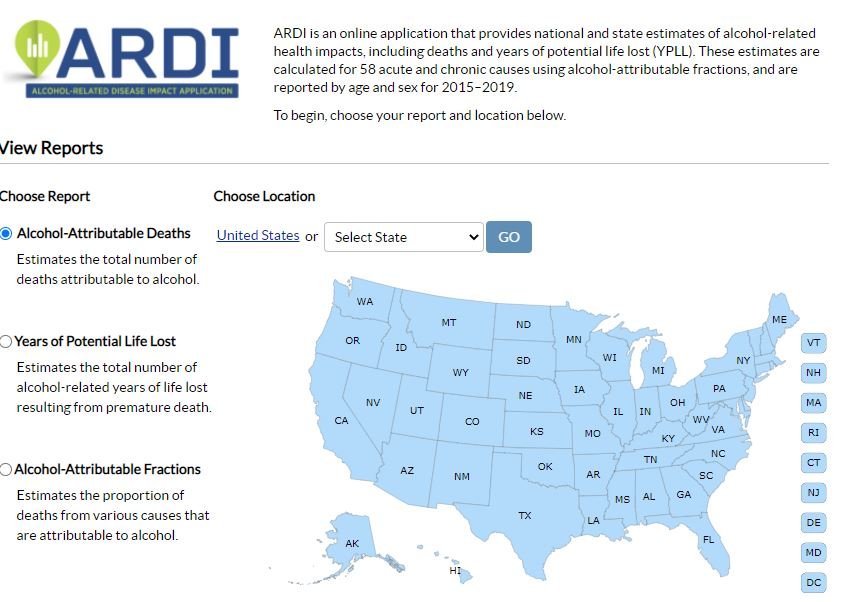
News

U.S. CDC Updates Alcohol-Related Disease Impact (ARDI) Application
The U.S. Centers for Disease Control and Prevention released the Alcohol Related Disease Impact (ARDI) application this week with new methodology. The interactive dashboard provides estimates for alcohol-attributable deaths and years of potential life lost according to 58 factors (e.g., age, sex, and state).

Increases Observed in OUI-Related Accidents
Recent traffic accidents in Maine have brought to light overall increases in OUI-related accidents. According to the Maine Department of Transportation, OUI accidents increased 10 percent between 2019 and 2021, with approximately 1,400 incidents last year. While commonly related to alcohol use, OUIs can involve various types of substances. Further, the article notes that Maine saw a record number of drug deaths in 2021.

Resources for Health Equity in Prevention
As states, coalitions, and agencies seek to become more inclusive in their prevention efforts, part of the New England Prevention Technology Transfer Center (PTTC) has published several products related to queer-inclusive programming for inclusive data collection regarding sexual orientation and gender identity.

Syndromic Data Reveals Increase in Alcohol-Related ED Visits During Pandemic
According to review of 2018–2020 National Syndromic Surveillance Program, while alcohol-related emergency department visits initially declined at the onset of the COVID-19 pandemic, mid-March–mid-April 2020, visits were higher during 2020 than corresponding quarters in 2018–2019. The article concludes that while fewer people sought ED care during 2020, alcohol-related visits declined to a less extent that total visits.

Changes in Tobacco, Alcohol, and Other Drug Use Among HS Students During Pandemic
The US Centers for Disease Control and Prevention (CDC) published a study this month examining prevalence of use of tobacco products, alcohol, and other substances among U.S. high school students during the pandemic (January to June 2021). Approximately one-third (32%) of 9-12 graders reported current use of any tobacco product, alcohol, or marijuana or current misuse of prescription opioids with substantial differences observed among students identifying as non-Hispanic, Native American or Alaska Native, gay, lesbian, or bisexual, and older students.

Study Finds Moderate E-Cigarette Use Among Youth Globally
Youth 12 to 16 years exhibit moderate e-cigarette use according to a study published by the American Journal of Public Health. Researchers used the Global Youth Tobacco Survey to observe prevalence of use and risk factors in 67 countries. Risk factors positively associated with e-cigarette use include maternal and paternal smoking, secondhand smoke exposure, youth cigarette use, and other youth tobacco use.

Coalition for Cannabis Policy, Education and Regulation Finds No Increase in Youth Use Among Legalized States
The Coalition for Cannabis Policy, Education, and Regulation (CPEAR) released a policy paper stating that states that have legalized adult-use cannabis have not seen the predicted increases in youth usage. Data reveal that youth usage has either decreased or remained the same. The article also highlights prevention strategies which are key to this success long-term.

US CDC Finds Changes in Alcohol- Related Deaths During the Pandemic
The JAMA Network published findings this week based on data from the Centers for Disease Control and Prevention and the National Center for Health Statistics. The study finds that the number of deaths involving alcohol increased between 2019 and 2020 by approximately 25%, while deaths from all other causes of death had much smaller relative increases.

Alcohol Cancer Risk Related to Support for Control Policies
Data from the 2020 Health Information National Trends Survey (HINTS) demonstrates a relationship between the awareness of alcohol-related cancer and the support of alcohol control policies. While a majority of Americans supported adding warning labels and drinking guidelines, support for banning outdoor alcohol advertising was heavily dependent upon use and perception of cancer risk.

New Research Makes Case for Earlier Prevention
A report from the Partnership to End Addiction makes the case that while substance use trends among youth have decreased overtime so has youth exposure to prevention messaging, which could negatively impact these trends in the long-term. The report suggests earlier and broader approaches to prevention.

Racial Disparity in Overdose Deaths for Opioid/ Stimulants
New York University Grossman School of Medicine and Wake Forest University School of Medicine researchers finds "between 2007 and 2019, the rate of Black Americans dying from opioids and cocaine climbed by 575 percent, compared to 184 percent among White people.”

Adjusting for Alcohol Consumption Underreporting
The National Library of Medicine releases study using the National Alcohol Survey, per capita alcohol sales data, to adjust 2011-2015 Behavioral Risk Factor Surveillance System (BRFSS) self-reported alcohol consumption estimates. The study explores six methods of observing changes in low, medium, and high average daily consumption to better account for and correlate to alcohol sales and alcohol-attributable deaths.

Minimum Pricing Policies May Reduce Alcohol Use
A recent study published in the National Library of Medicine finds that minimum pricing policies may reduce excessive alcohol use. The study explores three pricing policy options and compares them in a prospective analysis.

Maine CDC, Tobacco Comprehensive Strategic and Sustainability Plan Now Available
The Maine Centers for Disease Control, Tobacco and Substance Use Prevention and Control Program has issued their comprehensive strategic and sustainability plan for 2020 - 2025.

Disparities Identified in Opioid Overdose Among 55+ Adults
A study from JAMA Network Open identified a substantial rise in opioid deaths for adults 55 years and older from 0.9 deaths per 100,000 in 1999 to 10.7 per 100,000 in 2019.

Percentage of adolescents reporting drug use decreased significantly in 2021 as the COVID-19 pandemic endured
The percentage of adolescents reporting substance use decreased significantly in 2021, according to the latest results from the Monitoring the Future survey of substance use behaviors and related attitudes among eighth, 10th, and 12th graders in the United States.

Protecting Youth Mental Health: The U.S. Surgeon General’s Advisory
This Advisory offers recommendations for supporting the mental health of children, adolescents, and young adults. While many of these recommendations apply to individuals, the reality is that people have widely varying degrees of control over their circumstances. As a result, not all recommendations will be feasible for everyone.


2021 Quick Reference Guide
The Maine SEOW presents the 2021 Quick Reference Guide to help substance use prevention sub-grantees assess risk factors, use trends, and outcomes of substance use in their region and guide future strategies.

New CDC & OMH Minority Health Social Vulnerability Index
The Centers for Disease Control and Prevention (CDC) and the HHS Office of Minority Health (OMH) have launched a Minority Health Social Vulnerability Index (SVI) to help public health professionals better identify racial and ethnic minority communities at the greatest risk before, during, and after public health emergencies, like COVID-19.

